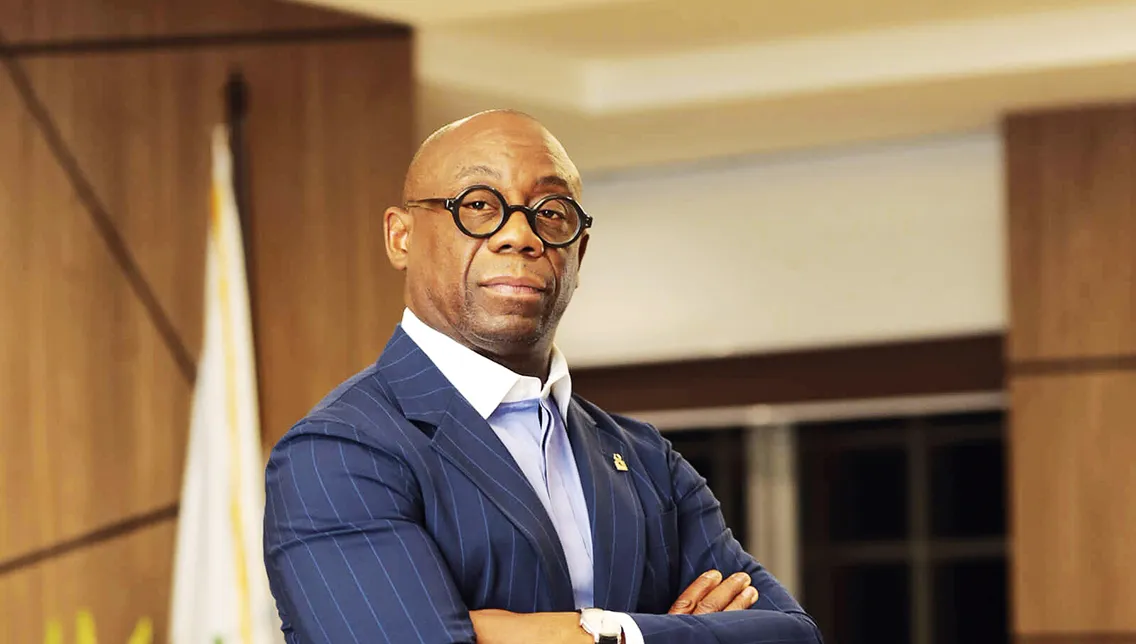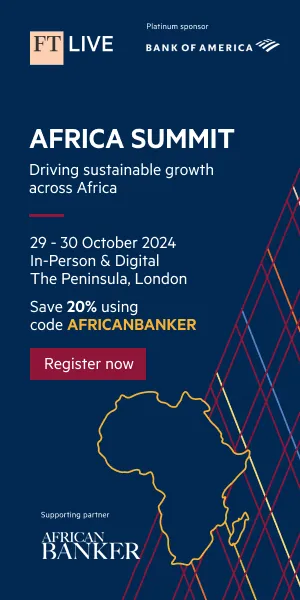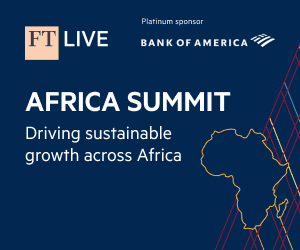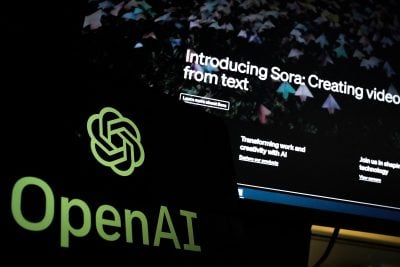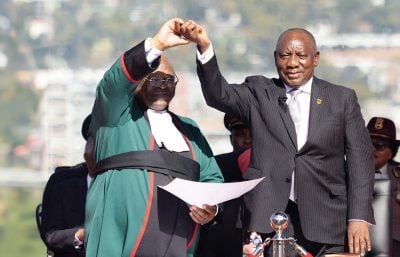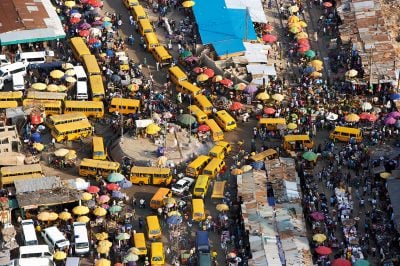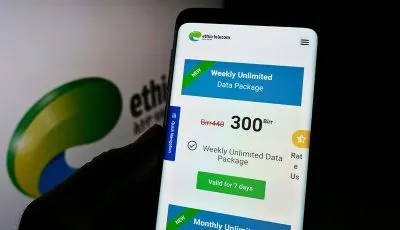Serge Ekué is quite clear what role his bank has to play in the region that it serves. “We deal with West African problems. You knock on our door, we never say no. Maybe we can’t do it the way you want us to do it, but we’ll figure out the best solution for you. We’re seen as a solution house. We provide solutions.”
But providing solutions requires a big war chest. He explains why raising additional capital is so necessary for the Bank to carry out its mandate.
BOAD’s approach contrasts sharply with that of other global financial players who cherry-pick their risks. “When no one wants to go in one of our eight countries, we have to go, in spite of whatever.”
For Ekué, the mandate has a direct bearing on the lives of people. “When you hear that 2,000 people are moved from one village to another, then we have a situation,” he points out. It reflects a deficit in critical infrastructure, jobs, and stability.
The bank’s role is counter-cyclical, he says. Summing up the Bank’s DNA, he reflects, “Structurally, we are risk takers.”
Playing that role effectively requires deep pockets. But raising capital is far more complex than might at first appear. When he first mooted the idea – even before becoming president of the bank – of doubling BOAD’s (at the time) $1.5bn tier 1 capital, there was scepticism from within the bank itself.
Overcoming the pessimists was one thing; the bank also had to deal with real constraints on its ambitions. Its member states, the first obvious point of call for capital injection, did not have the funds to do so.
Nevertheless, they did not want any new equity coming into the bank as this would have diluted their shares; and they wanted the existing governing structure, with the member states holding majority voting rights, to be maintained. “So that was the framework I had to work in, which was very strict. And the constraints were very high,” Ekué reflects.
After examining several options, the bank was able to strike an imaginative deal with the Arab Bank for Development in Africa (BADEA) to fund the increase without impacting individual member states’ budgets.
“The beauty of this structure was that it was between BADEA and BOAD on behalf of the member states. So the funds would be transferred directly from BADEA to BOAD.”
Ekué is extremely proud of this instrument. “It is the first-ever capital increase where the issuer funds the capital increase for its shareholders. Usually, shareholders have to participate or have their shares diluted. But we were able to structure it in a way that they would not be diluted. No one has ever done that in the world before,” he beams.
The $1.5bn capital increase was thus achieved through a unique and at the time unprecedented structure – $900m in tier 1 capital and $600m in a hybrid format. “Back in 2021,” Ekué recalls, “who was talking about hybrid capital for MDBs? No one. We were the first. Back then I was preaching in the desert.”
The challenge, Ekué recalls, wasn’t simply in raising the funds but constructing an innovative, non-convertible hybrid capital solution that wouldn’t disrupt BOAD’s governance structure. However, convincing analysts and investors to embrace this model proved to be an uphill battle.
“The structure is complex,” he admits. “When you speak to an equity analyst, he would understand, but then he’d tell you, ‘there’s a debt component here.’ So he’d send you to the fixed income analyst. Then the fixed income analyst would say, ‘there’s an equity leg there,’ and send you back to the first one.”
He explains that while people understand a Tier 1 instrument for corporates or banks, “a hybrid capital – without conversion – is unique. There’s no detachment point, no risk of conversion. It’s a pure hybrid, but without affecting governance.”
The complexity of the instrument was only part of the struggle. BOAD’s size and relatively modest share capital led some to dismiss the institution’s capacity for such innovation. “If it had been the World Bank or the Islamic Development Bank, maybe it would have been received differently. But BOAD? Too small, too complex, they said.”
Nevertheless, Ekué argues that this structure, though intricate, was essential for BOAD’s goals. “It was about creating a buffer – a safeguard – for the economic resilience of our member states.”
So far, $200m of the $600m in hybrid capital has been secured. Within the Tier 1 allocation, BADEA is also lending to member sovereigns.
“And as we speak, they hold 1%,” he notes. Efforts are also underway to finalise participation from eight non-regional stakeholders, which will complete the $900m Tier 1 tranche.
More muscle
The completion of the capital increase would help give BOAD the muscle it needs to play a bigger role in a region that needs ever more financing as climate, political and security risks metastasise.
Currently, the bank averages between €1-1.2bn in loan disbursements, with public sector projects making up roughly two-thirds to three-quarters of these loans, while the remainder supports private sector initiatives.
With the growing debt-to-GDP ratio of the region currently at 58.8% (just under the threshold of 60%), BOAD is actively working on strategies to reduce sovereign debt burdens and shift towards private sector partnerships and deconsolidation schemes.
“Technically, we’re very good at it,” Ekué says of the Bank’s efforts to support development in the region with innovative instruments that do not increase the debt burden, as recommended by the International Monetary Fund. “The rule is, as long as you do not burden the debts of the country, then it’s fine.”
It helps that BOAD has managed to retain its preferred creditor status (PCS), which Ekué describes as essential to the institution’s role as a first mover and structural risk-taker in the region. “We are very much attached to it,” he emphasises.
BOAD’s advantage, he says, stems from being “close to the action” – engaging with situations first-hand and at the highest levels, which enables the institution to gain an early and accurate understanding of unfolding events. “For us, it’s been proven that the PCS has worked for us, definitely,” he adds.
One of Ekué’s recommendations is for African countries to recycle assets such as roads or bridges to raise funds, rather than keep a hold on them, which he argues unnecessarily burdens external debt.
“Most of the time, [these assets] have been funded by external debt,” he notes, pointing out that, “you pay external debt to reimburse an asset of a value that is nil. From a strict financial and economic perspective, it’s nonsense.”
By creating assets with actual financial value and exploring debt-neutral structures, Ekué believes sovereigns can recycle current assets or launch new ones without impacting national debt. “This is the beauty of the structure we’re working on,” he says.
Connecting two worlds
BOAD’s role, Ekué says, is to be an interconnector, directing funds to the region. When we met Ekué on the sidelines of the World Bank annual meetings in Washington, he was talking to players from both the private and public sectors, many of whom he says have been quite impressed with BOAD.
“They need people who speak a language they understand and BOAD can do that. Take BlackRock, which holds $10trn of assets under management. We know how to talk to them and we can talk to those who need the money. Whether it is the private sector or public sector, we can be the interconnector between those two worlds,” he affirms.
The World Bank is also another partner that Ekué believes can help derisk lending to the continent, especially through DFIs like BOAD, which are the go-to banks for regional development.
While expressing admiration for the disruptive mindset of Ajay Banga, President of the World Bank, Ekué calls for a new approach. “For example,” he explains, “when I issue an instrument, the World Bank or the AfDB can subscribe as a triple A-rated institution. So it’s a guarantee which literally means that in case any situation arises, I’ll be by your side.”
He likens this to an insurance product which elevates bonds issued by smaller DFIs. “When I issue a bond that’s insured by an AAA institution, my bond looks better, looks nicer,” he says, adding that it allows BOAD to offer single A-rated bonds that yield returns of 5% to 6% – significantly higher than typical single A bonds on the market.
Ekué insists that such guarantees are meant to be of absolutely last resort. “You don’t want to talk to your insurer because if you do, it means you have a (tricky) situation, but you protect yourself just in case.”
Adapting and innovating
This is the future that he foresees for DFIs – adapting and innovating to serve the countries and the continent better. With changes in the global financial landscape, DFIs will have little choice other than to consider innovative financial instruments such as hybrid capital, collateral capital and others. “Five years ago, no one was talking about hybrid capital for DFIs, for example,” he observes.
Discussing the often thorny issue of how global ratings agencies assess the continent and its institutions, often with a negative perception, Ekué believes that more engagement can help address some of the misconceptions. “The more you talk, the better it is. The more you’re transparent, the better it is.”
He says wryly that when he took over, the received wisdom was “the less you talk, the better it is!” He believes this open dialogue allows agencies to see the efforts DFIs like BOAD are making to innovate and adapt. Current rating models are also not yet designed to account for these novel financing structures and thematic investments. “The problem is that the models they use do not factor in all this,” he argues. That, however, is beginning to change. “They understand that the world is changing and so they have to change.”
This insight will be crucial in his new role as co-chair of the International Development Finance Club (IDFC), along with Javier Díaz Fajardo, President of Bancóldex, a South American DFI.
Ekué believes that the organisation, which draws its membership from both the developed and the developing world, allows for a shared perspective on challenges and solutions in development finance. The central question for these institutions, in his view, is how to unify their efforts to better advocate for the industry. “How can we be the spokesman for our emerging market institutions? How, when it comes to callable capital, can we make sure that the rating agency considers the way we work in a better way? It gives us another level of exposure. We will combine our efforts, our energy, so as to make sure that our strategy prevails.
“We have to combine our efforts and energies to make sure that our voice counts because we face the same challenges.”
Given the nimble way that he has so far been able to find a promising path through obstacles and pitfalls, Serge Ekué is more than likely to achieve all the goals he has set out for himself.
Want to continue reading? Subscribe today.
You've read all your free articles for this month! Subscribe now to enjoy full access to our content.
Digital Monthly
£8.00 / month
Receive full unlimited access to our articles, opinions, podcasts and more.
Digital Yearly
£70.00 / year
Our best value offer - save £26 and gain access to all of our digital content for an entire year!
 Sign in with Google
Sign in with Google 